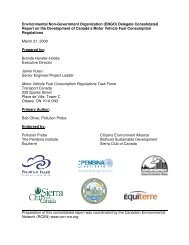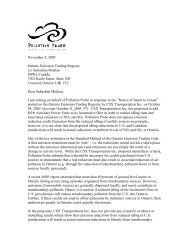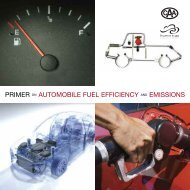Primer on Bioproducts - BIOCAP Canada
Primer on Bioproducts - BIOCAP Canada
Primer on Bioproducts - BIOCAP Canada
Create successful ePaper yourself
Turn your PDF publications into a flip-book with our unique Google optimized e-Paper software.
Similar to c<strong>on</strong>venti<strong>on</strong>al fossil fuel-based plastics, polylactic acid isdurable and can be shaped and moulded to create a number ofuseful products, ranging from grocery bags to toys. It can be usedas a textile and can readily replace nyl<strong>on</strong>, polyester and polystyrene.Plastics made from petroleum products are resp<strong>on</strong>sible forworldwide landfill and other polluti<strong>on</strong> problems. While polylacticacid plastics are also slow to degrade in the envir<strong>on</strong>ment, work isbeing d<strong>on</strong>e to blend this material with cornstarch or resin to makeit more biodegradable, according to the US Department ofAgriculture. These plastics require far less energy to produce thanc<strong>on</strong>venti<strong>on</strong>al plastics. Researchers are also studying ways toproduce polylactic acid from tough stems, husks and woodyleftovers (i.e., cellulose) from farming and forestry.Enzymes as Industrial AgentsEnzymes are large, organic helper molecules that assist and speedup the chemical reacti<strong>on</strong>s necessary for life. These (mainly) proteincatalysts grab the chemicals involved in a reacti<strong>on</strong> and bring themtogether, letting go again when the desired reacti<strong>on</strong> has occurred.In some cases, industry has been able to isolate these chemicalmatchmakers from the plants, animals and micro-organisms inwhich they naturally occur, and to put them to work. Enzymescan carry out very specific tasks, so enzyme-mediated chemicalprocesses can be highly efficient. Some enzyme-mediatedprocesses use less energy and produce less waste thanc<strong>on</strong>venti<strong>on</strong>al industrial chemistry.Through genetic engineering or by “molecular evoluti<strong>on</strong>” (i.e.,rapidly “evolving” enzymes through a process that imitatesnatural evoluti<strong>on</strong> and selecti<strong>on</strong>), industry can modify and directthe work of enzymes to help with entirely new chemical reacti<strong>on</strong>sor to work in specific c<strong>on</strong>diti<strong>on</strong>s, such as high temperatures andhigh acidity.Enzymes at WorkThe global market for industrialenzymes is valued at more than $1billi<strong>on</strong> annually, according to the OECD.It c<strong>on</strong>tinues to grow by about 10 percent per year. Increasingly, enzymesare playing a pivotal role in industrialprocesses around the world.Right now, for example, enzymes canoften be found in laundry detergentto better remove stains. They arealso used to c<strong>on</strong>vert cellulose tosugar, to bleach paper, to curdlemilk for cheese, and to improve thec<strong>on</strong>sistency of flour in bread making.Iogen Corporati<strong>on</strong> (<strong>Canada</strong>) —Ottawa-based Iogen Corporati<strong>on</strong>has developed an enzyme hydrolysistechnology that readily breaks downcellulose — the tough, woody materialfound in straw, corn stalks, woodand orchard trimmings — so that itcan be c<strong>on</strong>verted to bioethanol fuel.Ethanol from biological sources hasbeen promoted as a fuel alternativethat can help reduce the greenhousegas emissi<strong>on</strong>s associated withgasoline. One problem has beenthat the <strong>on</strong>ly easy way to getethanol from plants is to c<strong>on</strong>vert itfrom starchy plants, such as cornand grain. Iogen, which has built asubstantial business developingnovel industrial uses for naturalenzymes, is now able makeenvir<strong>on</strong>mentally friendly fuel fromthe parts of food crops traditi<strong>on</strong>allyunderused or aband<strong>on</strong>ed in thefields. Iogen’s dem<strong>on</strong>strati<strong>on</strong>-scaleplant for producing “EcoEthanol” canPRIMER ON BIOPRODUCTS35
















